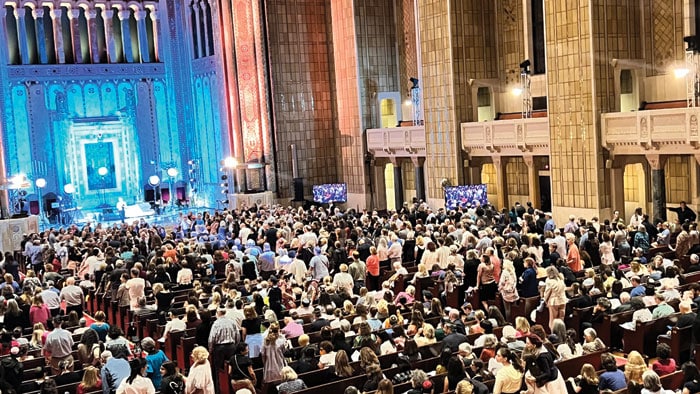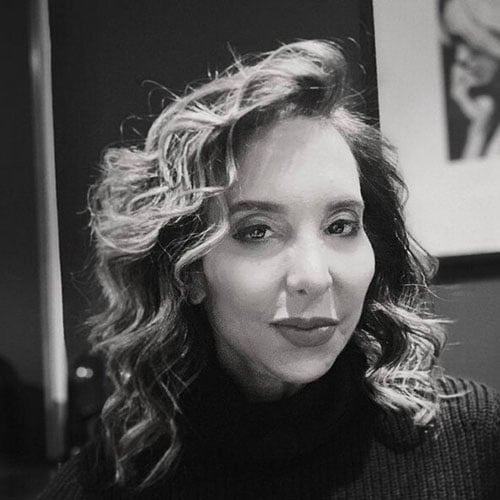
Under the majestic Romanesque ceiling of Temple Emanu El’s sanctuary, the Israeli musical sensation Koolulam made its New York City debut after more than two years of COVID postponements.
In 2018, I had been lucky enough to see conductor, musical director, and co-founder Ben Yaffet perform at an awards ceremony. “We can’t control life but we can control our perception of it,” he had told the crowd, before leading them in a three-part harmony of Fun.’s “We Are Young.”
But it wasn’t a full-on Koolulam “experience” — creating with the audience a multi-layered video, as the group had done in Haifa with Matisyahu’s “One Day” and at the Tower of David with Bob Marley’s “One Love.” With colorful globe lighting accentuating the beauty of the bima, the group began the evening’s experience with an exquisite rendition of “Od Yavo Shalom Aleinu,” the song of peace by Mosh Ben-Ari. We were being primed for Koolulam’s unique spiritual seduction.
For any of the 1,600 guests who expected to just relax and listen to Koolulam’s ethereal magic, they were in for a surprise. We had work to do: assiduously learn the three-part harmony of Bill Withers’ “Lean on Me.”
“Some… times in our lives
We all have pain
We all have sorrow.
But… But if we are wise
We know that there’s
Always tomorrow.”
As my eyes began tearing up, I kept thinking about one question: When does music — art — become a spiritual experience?
As my eyes began tearing up, I kept thinking about one question: When does music — art — become a spiritual experience? I used to go to B’nai Jeshrun Synagogue every Shabbat, just for the hauntingly beautiful music. I would just to sit and let the tears flow — it was my weekly detox. At my current synagogue, Park Avenue, Cantor Azi Schwartz is renowned for his deeply emotional voice; his rendition of Leonard Cohen’s “Hallelujah” in Hebrew is almost too beautiful.
But the sad fact is that not all synagogues understand the power of music to make a beeline to our souls. And what Koolulam adds to that is the power of music to unite—and the power of that unity.
Yaffet himself is a spiritual spark plug. With his body and dreadlocks flying through the air, he seems to almost literally create the fireworks of beauty and light that fill the sanctuary. The experience of watching him, both in person and on the videos, is indeed transcendent. But it is transformative as well. When he speaks about harmony and unity, about “harnessing the power of musical harmony to inspire harmony in humanity,” it never sounds forced or inauthentic. It comes from his soul, and is intended to transport—elevate—our souls.
“Lean on me
When you’re not strong
And I’ll be your friend
I’ll help you carry on
For it won’t be long
“Till I’m gonna need somebody to lean on.”
So what are the underlying elements of a Koolulam experience? A beautiful song yes, one that’s deeply emotional. The mystical magic that comes from a three-part harmony—from a chorus of unity. But there’s something else that I didn’t fully realize until co-founder Michal Shahaf Shneiderman said that evening: “Most of our strength is in our vulnerabilities.”
Music’s spirituality works best for those who are open to it. As the author R.M. Drake put it: “Sunshine comes to all who feel rain.” Those of us who tear up at the world’s beauty often feel that this sensitivity is a weakness. But she’s right: when used the way Koolulam uses it, our acute sensitivity can be an incredible strength. And what Koolulam does is unveil that sensitivity in those who have closed it off.
It’s only going to be through the power of art — and most especially music — that we can overcome all of the hate, divisiveness, and despair that we’re all drowning in.
Right now, we’re living in a highly closed off society. Where beauty and spirituality are considered vapid, destructive forces. Where even the act of creativity is frowned upon. But it’s only going to be through the power of art — and most especially music — that we can overcome all of the hate, divisiveness, and despair that we’re all drowning in. Our souls need spiritual beauty just as our minds need truth and reason.
The sacred light of Koolulam inspires each of us to reach for our best selves. It also inspires creativity. And as Yaffet, who literally embodies a Judean miracle, put it: “Where there is creation, there is hope.”
Koolulam.mp4 from Temple Emanu-El Streicker Center on Vimeo.
Karen Lehrman Bloch is editor in chief of White Rose Magazine.






















 More news and opinions than at a Shabbat dinner, right in your inbox.
More news and opinions than at a Shabbat dinner, right in your inbox.